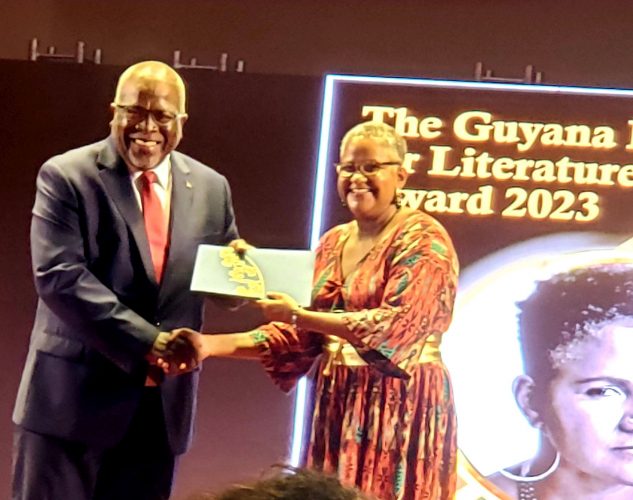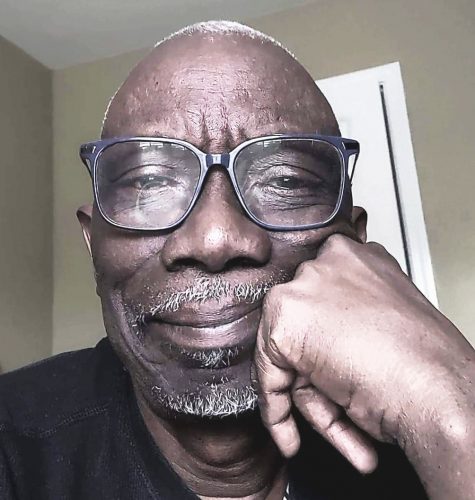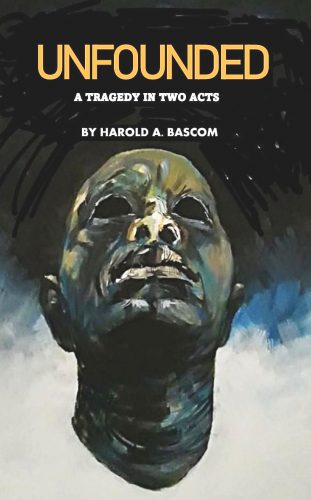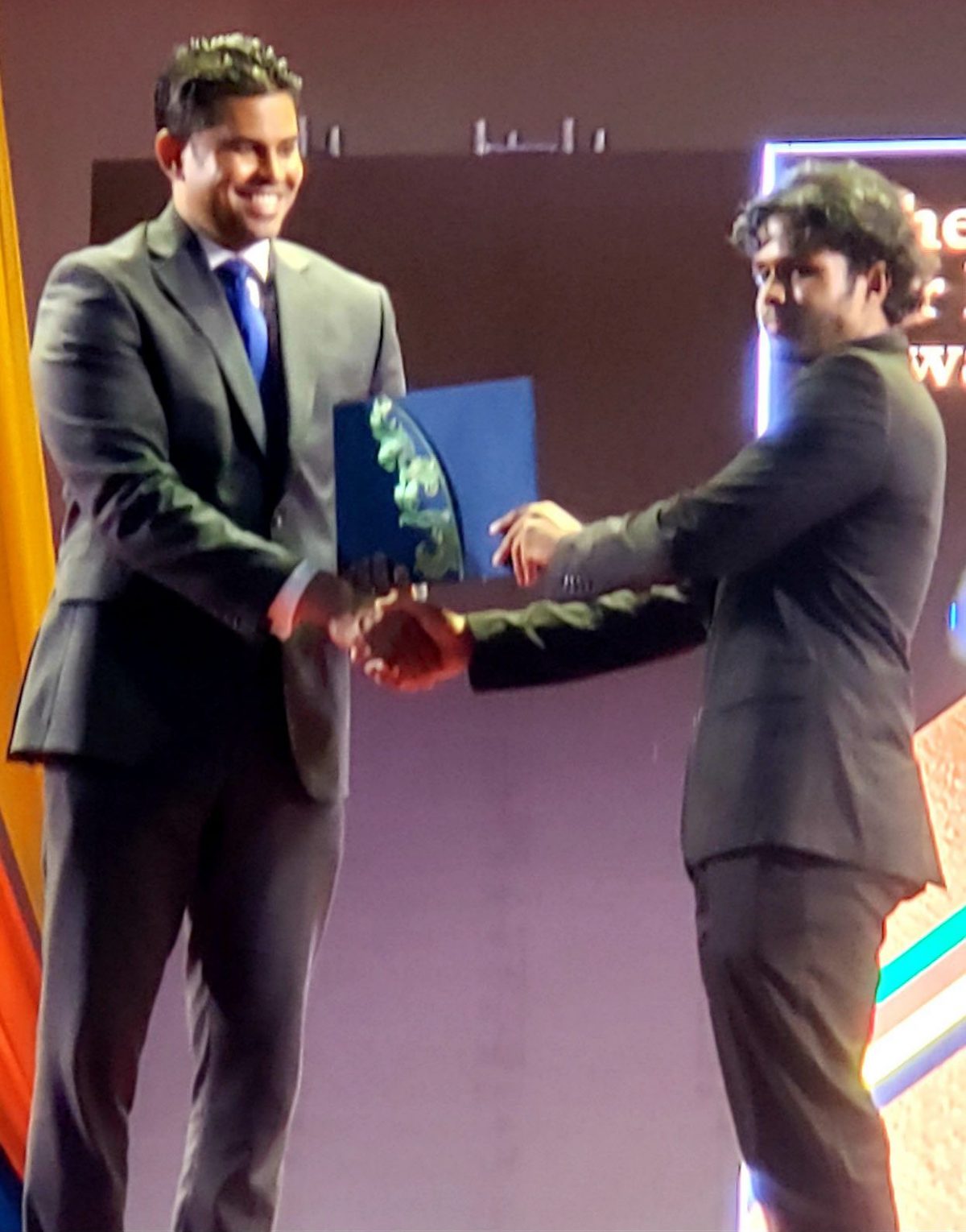By Miranda La Rose
Publication is a major concern as there is no local printing press that a writer could readily approach, according to winners of the 2023 Guyana Prize for Literature.
This is the consensus of five-time winner of the Guyana Prize for Literature, Drama, Harold Bascom; winner of the 2023 poetry award Ruth Osman; and two-time winner of the Youth Category Short Story Samir Mohammed in interviews this past week. This sentiment was also expressed in earlier interviews with winner of the 2023 non-fiction award Dr Estherine Adams and winner of the 2023 fiction award author/journalist Michael Jordan.
With the exception of Osman, the others submitted their work in manuscript or book manuscript forms and are looking for publishers.

“Things aren’t good for creative writing in Guyana. Michael Jordan’s manuscript won the prize for fiction and nobody would say they would like to see it printed,” Bascom told Stabroek Weekend in an interview from his home in Georgia, USA.
Mohammed who won the 2023 short story award with “At the Bottom of the Sea” as well as the first prize in the short story category in 2022 said his writings are still unpublished.
Osman, a first-time winner, was more fortunate than the others. A publisher heard her reciting a poem in Trinidad and Tobago where she lives and offered to publish her work.
Meanwhile, Bascom declared that he believes the Guyana Prize has lost its lustre. “It is not a prestigious prize anymore. I feel it has been reduced to something like the Chronicle Christ-mas annual where they try to patronise everybody because the powers-that-be took it over to please the lazy local writers. Literature is not going to be taken seriously until the powers-that-be recognise it should be handled by an independent body. The University of Guyana should be given control of it. The Guyana Prize for Literature has faded into irrelevance as far as many literary-minded people are concerned,” he stated.
Going forward, he said, he will not take part in the literary competition again unless its management is no longer under the Ministry of Culture.
Samir Mohammed
Mohammed was not surprised that he won the short story award. “I was very happy. I felt it was my masterpiece. Not being conceited,” he said, “there aren’t many people my age who would have that kind of skill.”
Mohammed, 18, a physics associate degree graduate, and now a student of the bachelor’s degree programme in computer science at UG, is writing his first novel which has similar dark themes to his short stories.

“However, it is more broad in its spectrum. It delves into the human experience, artificial intelligence, and what humanity means in terms of connection and connectivity,” he said. “I’m really trying to take my time with it, perfecting it as I see fit because it is dealing with a lot of heavy existential topics that necessitate prudence and attention to details. It is set in a fictional world parallel to our own where things and technology have taken a different path, yet mirroring technology’s current path with artificial intelligence.”
His 2023 winning entry, “At the Bottom of the Sea”, deals with Mohammed’s own struggles with isolation and loneliness and how he eventually came to grips with what he was searching for.
“It is a story of self-realisation, reflection, introspection and the importance of hope and perseverance,” he said.
The story outlines the events following the abandonment of someone on a deserted island to man a lighthouse.
“I was going through a bit of a bad time in my life so I expressed that through writing this story as a means to try to inspire myself to regain that spark I needed. In a way I was vicariously living through this character. I believe I accomplished a great deal of self-realisation writing this character because the more I wrote, the more I felt I understood myself,” he said.
The day before the awards ceremony Mohammed was robbed and physically assaulted. While it dampened his spirits a bit he chalked it up to experience and the other side of humanity “I put most of my efforts into my short story, so much so that it went over the word limit for the competition that I had to break it down to its most essential features.”
His entry in the 2022 short story category was “So Does it Stare Back?” His winning poem last year was “Blood and Oil.’ His poem was shortlisted in the 2023 competition.
Ruth Osman
Osman won the first prize in the Best First Book of Poetry and the second prize in the Best Overall Book of Poetry with her collection, “All Made of Longing”. This was her first foray into the Guyana Prize, and she did not expect any win. At the most she thought she might have been longlisted or shortlisted.
“The Guyana diaspora is huge with people there who would submit their works. I felt my chances of actually winning were pretty slim,” she said.
Ian McDonald won Best Overall Book of Poetry. “I grew up reading McDonald’s poetry,” she said. “I studied his work in high school and at university. For me to even imagine that my first book of poetry placed second just after his was almost unbelievable.”
Moving forward, Osman, a singer/ songwriter, plans to release by year end, a hybrid album in which some of the poems from her winning collection, “All Made of Longing” will be set to music. “I will sing while the band plays the music, then I will recite a poem and then I will sing again. That’s a track,” she said.
She works with a group of musicians in Trinidad that include musical director Wayne Guerra, percussionist Sheena Richardson, jazz guitarist Theron Shaw, drummer Makesi Joseph, bassist Clint Harewood, singers/songwriters Karla Gonzales and Gerelle Forbes. Apart from being musicians they are all artists with their own careers.
During Covid-19 when she could not meet with the band, she started to write poetry again as an outlet for her creativity. Osmn has written poetry since her childhood, but her focus was on music.
Osman recited a few of her poems in Songshine, an open-mic event hosted by Gillian Moor, singer/songwriter/poet. Paula Obe, a poet and publisher and another Songshine regular, heard Osman and liked what she heard. She then told Osman about her printing press in Trinidad and her wish to see her manuscripts. Satisfied with Osman’s work she offered to publish and so Bamboo Talk Press in Trinidad became the publisher of Osman’s debut collection.
“I really owe Paula a lot for taking the whole project under her wing. I couldn’t have done it without having someone who was willing to support me,” Osman said.

Once Osman knew her work was going to be published she was more strategic and consistent in her writing. “Before that, I wrote when I felt inspired and I had a vibe to write something,” she said.
Originally her publication was meant to be a chapbook, a small collection of not more than 30 poems with which most poets start out. She decided, with encouragement, to expand it to a full poetry collection. Apart from writing some newer ones she pulled some of her older poems she thought were good enough.
“That was how ‘All Made of Longing’ became a collection of 46 poems,” she said.
Most were written during the Covid-19 lockdown, but a few were older. The oldest, “Sunshine” was written about 18 years ago.
The main theme running through the poems is different types of longing and desire from a woman’s perspective, she said. Longing for home, longing for self-expression, for growth and evolution, for freedom from societal norms and pressures, for love, tenderness and love-making.
“Longing for the closeness of the child who started pulling away as she gets older,” said Osman, who is mother to a daughter.
“Also because this is the Caribbean experience, it’s a desire for self-actualisation; a desire for independence from slavery and colonialism. It’s a desire for freedom that speaks directly to the experience of kidnapped Africans on the Trans Atlantic trade who jumped overboard,” she added.
Osman plans to continue writing and publishing. “I have some new poems since ‘All Made of Longing’ that will go into a second collection, God grant life. Writing is one of those careers that is not short and fast,” she noted.
Harold Bascom
Bascom, a five-time winner of the drama category, expected to win with his submission, “Unfounded”, a full length drama, which he wrote over a short period. When Michael Jordan suggested he enter the Guyana Prize, he said, he was not interested. A month before the deadline he changed his mind. “I write fast,” he said.
He was not surprised at winning. “I know the level of my writing and the level of the local Guyanese thinking and writing. A lot of the local guys are not reading enough. To write well you have to read well,” he stated.
When he wrote his other winning entries “Two Wrongs”, which speaks of unity; “Makantali”, a story of redemption and a Guyanese classic; “Blank Document”, a radio drama; and “Desperate for Relevance”, he knew he would have won. “I push myself brutally. I am very self-critical. My plays must be on par with those on the international level,” he stated.
His work, “Unfounded”, a tragedy, is about the racial tensions between the two major race groups, he said.
“It’s about African Guyanese and Indian Guyanese who are racially disrespectful to one another. That disrespect is not being addressed. As a playwright affected by the situation, I decided to write a play to see if once and for all we can face our racial nonsense and understand that we have one common goal and that is to make Guyana right,” he said.
Bascom grew up in New Road, Vreed-en-Hoop in a predominantly Indian community, “where when Indian and Black children got into little stories, you quickly hear, ‘Black Man stink’ and ‘Coolie man rank,’” he recalled. “That was how it went and then we got back together and played. Then come general elections and the adults get into it similarly. That has been going on since then until today.”
Recalling the race riots of 1964 and recent utterances on social media, Bascom fears a recurrence of 1964 when, “Blacks murdered Indians and Indians murdered Blacks. I told myself it is time we face this race nonsense and so I wrote ‘Unfounded’.”
He gave the play that name because the many so-called realities in Guyana are not based on facts, “such as the national motto of ‘One People, One Nation, One Destiny’ or ‘One Guyana’,” he said.
The play looks at the rumours of an impending Venezuelan invasion, which he used to ask questions to see how unified Guyanese are.
“Are we going to come together to fight a common enemy? Are we going to sing, ‘Not a Blade of Grass’ when the bombs start falling? Or are we going to look to England or America or somebody else to save us?” he questioned.
The central figure is the narrator, Budday, who has a little of every race. “On stage, Budday calls on his audience to listen while questioning to make them think. You is me and I is you. He is a figure who tries to pull the audience together into understanding that all ah we is one. All ah we is mixed up and in this mixed-upness, we could forge a nice destiny,” he said.
Aside from that there is a love affair between a Black Guyanese Tyrone Blackman and an Indian Guyanese Indranie Gunraj. Indranie gets pregnant by Tyrone. Her father sees her as a disgrace and decides to kill Tyrone but his son Ravi takes the gun away from him.
“The issue of race, religion and skin complexion is dominant in the play. In another scene, Ravi has a good friend, Quasi, whose father tells him, ‘Never trust a coolie. The only good coolie is a dead one’. In Ravi’s home, his father asks him what he is doing with a Black man as his friend,” he revealed.
Bascom said the play shows the splintered reality not heard on the road but which happens in homes.
Later on, Indranie’s father hires a hitman, a Black policeman, to kill his daughter. “I am playing with the shades of the Phantom Squad’s reign in Guyana. Writers need to document these things. We should not allow these things to go under the rug,” he said.
The hitman finds Indranie and Tyrone together and has a change of heart. He tells Tyrone to cut off Indranie’s ponytail and give it to him to take back to Indranie’s father to show he had gotten rid of Indranie.
Bascom noted that producers have approached him to stage the play. However, he does not think it will see the light of day in Guyana. He is now working on a commissioned Chinese drama.





